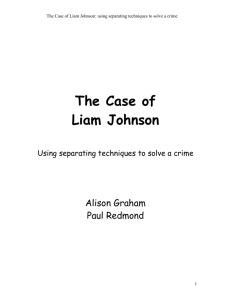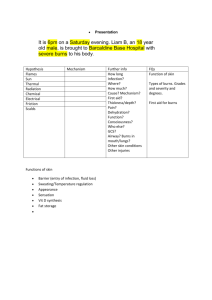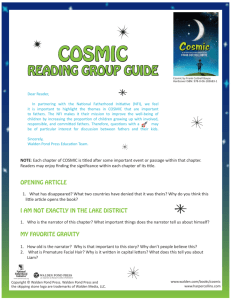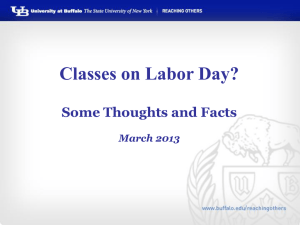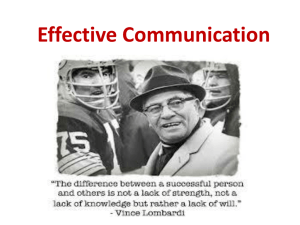7 C's of Effective Communication: Presentation
advertisement
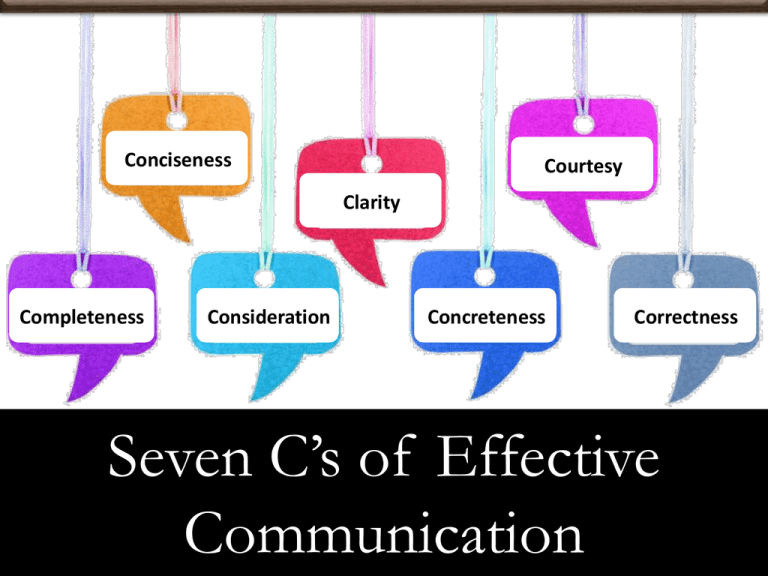
Conciseness Courtesy Clarity Completeness Consideration Concreteness Correctness Seven C’s of Effective Communication Course Objectives Describe the Components of Communication Process Explain What makes Communication Ineffective Explain the Seven C’s of Effective Communication Explain How to Communicate by Showing Consideration Explain the Use of NATO Phonetic Alphabet for Clarity Explain Role of Tone in Appearing Courteous Explain the Use of Vocabulary for Correctness Explain the Strategies to Apply Seven C’s of Communication List the Characteristics of a Good Communicator List the Tips for Effective Communication Introduction Liam Conner is a Project Manager at Ubersoft Software Inc. He is responsible for handling a team of twenty-five software programmers, developers and testers. Liam is also the single Point-ofContact (POC) on all the Projects and for the clients. Introduction Recently, Ubersoft bagged a large project for developing the Customer Relationship Management (CRM) software for an esteemed bank, Goldmann Bank. Liam and his team are going to work on the ‘Goldmann CRM’ Project, as it was named. Introduction The schedule for the project was very tight and all the team members including Liam were required to work extra hours. As per Ubersoft’s Company Policy, each employee had the flexibility to put in extra hours either from office or from home. Introduction Hence, an employee working extra hours from home could access the company servers by logging into the Company’s Virtual Private Network (VPN) from his home. Liam submitted the initial design document to the client for their review. Introduction Liam decided to work over the weekend from home. He was supposed to attend a conference call with the client on the weekend to discuss the review of the design document and finalize the changes in it. Introduction Before the weekend, Liam had shared his mobile number over a phone with the client. Liam thought that the client could call him on his mobile number anytime over the weekend to discuss the design document. Introduction Liam waited for the client’s call over the entire weekend but he did not receive any call from them. He also checked his mail but did not see any mail from the client. Introduction After Liam reached his office on Monday, he called the client himself to discuss the design document. Liam was shocked to find that the client had not noted down Liam’s mobile number correctly. Introduction In fact, the client had tried calling Liam several times over the weekend and was frustrated that Liam had not given his mobile number correctly to him. Liam lost face in front of the client and also valuable time was wasted as the design document was not finalized over the weekend. Introduction Hence, you can understand the criticality of effective communication. All this confusion could have been avoided, if Liam had shared his mobile number and then cross checked with the client to see if the client had noted it down correctly. Introduction Hence, you can understand that effective communication involves many factors that have to be considered to make it effective such as the ‘Seven C’s of Effective Communication’. Components of Communication Process Message Sender Decoding Encoding Media Feedback Response The main components of communication process are as follows: • Context • Sender / Encoder • Message • Medium • Recipient / Decoder • Feedback Let us look at each component in detail. Receiver What makes Communication Ineffective? It is important that before learning to communicate effectively, you should understand the key barriers of communication . These barriers make communication ineffective and are as follows: 1 2 3 4 5 6 7 8 9 10 11 12 13 14 15 Seven C’s of Effective Communication There are 7 C’s of effective communication which are applicable to both written as well as oral communication. Awareness of the 7 C’s of communication makes you an effective communicator. The 7 C’s of effective communication are as follows: Conciseness Courtesy Clarity Completeness Consideration Let us look at each in detail. Concreteness Correctness Completeness ‘Completeness’ means that the communication must be complete or consummated. It should convey all facts required by the audience. The sender of the message must take into consideration the receiver’s mind set and convey the message accordingly. Using NATO Phonetic Alphabet for Clarity The 'NATO Phonetic Alphabet' is also known as 'International Radiotelephony Spelling Alphabet‘, or 'ICAO Phonetic' or 'ICAO Spelling Alphabet' or 'ITU Phonetic Alphabet'. These spelling alphabets were developed by the International Civil Aviation Organization (ICAO). The ICAO assigned various code words to letters of the English Alphabet. These code words help to pronounce critical combinations of letters and numbers. They are helpful for understanding voice messages transmitted and received over the radio or telephone regardless of language barriers or the presence of transmission static. Concreteness ‘Concreteness’ or a ‘Concrete’ communication implies being particular and clear rather than fuzzy and general. Concreteness strengthens the confidence. Role of Tone in Appearing Courteous • It is easy to understand the tone of a person while speaking. However, it is very difficult to understand the tone of a piece of writing. • Tone is the quality in your speech or writing that reveals your attitude toward your audience or reader. Tone comes from your choice of words, the structure of your sentences, and the order of the information you present. Tips to Improve Workplace Communication • Hence, it is important that you have to create a positive impression at the first go itself. • It is important to do your work well but what is more important is presenting your work well. • An individual has to be very careful about his communication skills to perform well at his workplace and have an edge over his fellow workers. Real Life Example Look at the conversation given below between a Customer Service Representative (CSR) of Skynet, a leading Telecom Service Provider and its customer, Georgia. Note: Some parts of the conversation have been highlighted to point out instances of cases where the ‘Seven C’s of Effective Communication’ are in play. Please understand that although there may be more than one place at which the same ‘C of Effective Communication’ may come into play, only one instance of each ‘C’ has been highlighted. ManagementStudyGuide.com This is a DEMO Course On – Seven C’s of Effective Communication. Join Now and Get Access to Unlimited Courses. What Do you Get: 1. View All Courses Online. 2. Download Powerpoint Presentation for Each Course. 3. Do the Knowledge Checks for Each Course.




